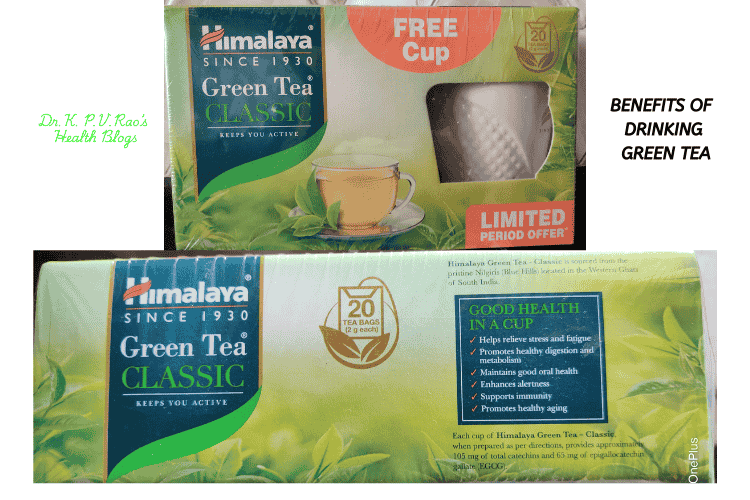Introduction to the Benefits of Green Tea
Listen to this article-
A few days back, one Medical Rep from the Himalaya Wellness company gifted me a pack containing 20 packets of green tea with a teacup to go with it. [As shown below in the image]

I was particularly attracted to the information given on the side of the box, shown as Good Health In A Cup. You can also see it shows many benefits. Intrigued by this information, I thought I should do some research, and the result of this research is this article that you are reading now.
As I later found out, Green tea offers much more benefits than what is mentioned in the image. I have started using this product and already I am experiencing it’s various benefits!
So, what exactly is this green tea?
Green Tea-its origin and history
Green tea, known for its vibrant color and distinct flavor, has been cherished for centuries. Originating from China, this ancient beverage has travelled continents and embedded itself in various cultures, from the elaborate tea ceremonies of Japan to the everyday rituals of Middle Eastern societies. Its rich history is a testament to its enduring appeal and multifaceted benefits.
Unlike its black tea counterpart, green tea undergoes minimal oxidation during processing, preserving its vibrant green color and potent compounds.
One such compound that garners significant attention is epigallocatechin gallate (EGCG), a powerful antioxidant contributing to green tea’s health-promoting properties. These polyphenols help combat oxidative stress, reduce inflammation, and enhance overall health.
In recent years, green tea has surged in popularity, not just in its traditional forms but also as an ingredient in modern culinary and wellness practices.
From matcha lattes to skincare products, green tea’s integration into contemporary lifestyles highlights its versatile benefits.
This growing trend is supported by a wealth of scientific research pointing to green tea’s potential in promoting-
- heart health,
- enhancing cognitive function,
- aiding in weight management, and
- boosting the immune system.
Given its array of health benefits, it is no surprise that green tea continues to be celebrated both as a daily ritual and a potent wellness elixir.
As we go deeper into the specific ways in which green tea contributes to health and well-being, it becomes increasingly clear why this ancient brew has captivated humanity across eras and geographies.
Key Ingredients in Green Tea and Their Health Benefits
Green tea boasts remarkable health benefits, primarily due to its unique bioactive compounds.
Epigallocatechin gallate (EGCG): This is a powerful catechin, that stands out among these compounds. Renowned for its potent antioxidant properties, EGCG plays a crucial role in minimizing oxidative stress and combating cellular damage.
Scientific studies reveal that regular consumption of EGCG significantly enhances metabolic rates, aiding in weight control and management. Additionally, EGCG is linked to a reduced risk of chronic diseases, including cardiovascular disease and certain cancers.
Bose et al. found that supplementation with dietary EGCG (3.2 g/kg diet) for 16 weeks significantly reduced body weight gain, body fat percentage, and visceral fat weight in mice compared with those not receiving EGCG treatment (Bose et al., 2008).

Catechins: These are flavonoid polyphenols, also exhibiting strong antioxidant effects. These catechins not only complement EGCG in neutralizing harmful free radicals but also provide anti-inflammatory benefits that support overall health. Research indicates that green tea catechins improve blood flow and reduce blood pressure, decreasing risk factors for heart disease.
L-Theanine, an amino acid found exclusively in tea leaves, offers another layer of health advantages. This compound promotes relaxation and enhances cognitive function without causing drowsiness. By influencing neurotransmitter activity in the brain, theanine reduces anxiety and fosters a state of calm alertness, boosting productivity and mental clarity.
Antioxidants, including vitamins C and E, bolster the body’s defense mechanisms against oxidative stress. These antioxidants are crucial in preserving the integrity of cells and tissues, ultimately diminishing the effects of aging and reducing the likelihood of chronic illness development.
Collectively, the synergistic effects of EGCG, catechins, and other antioxidants in green tea contribute to its extensive health benefits.
Useful resource:- Healthline on EGCG
How Green Tea Fosters Physical Health
Green tea, abundant in antioxidants like epigallocatechin gallate (EGCG), offers extensive benefits for physical health.
Boosting weight management
This feature stands out as one of green tea’s most significant advantages. Regular consumption elevates metabolic rate and enhances fat oxidation, making it an ideal supplement for weight maintenance or loss.
Consuming three to four cups daily can significantly boost these metabolic benefits, which, in the long run can help healthy aging.
Enhancing cardiovascular health
This is another benefit linked to green tea. The antioxidants reduce oxidative stress and inflammation, crucial factors in heart disease development. Studies indicate that regularly drinking this tea lowers LDL cholesterol levels and improves blood vessel function, potentially reducing the risk of heart attacks and strokes.
Preventing cancer
This is another promising property of green tea. The high EGCG content overcomes the growth and spread of cancerous cells and stops tumor growth.
Research suggests that regular consumption may lower the risk of cancers, including breast, prostate, and colorectal cancer.
Consuming three to five cups of green tea daily is generally safe and sufficient for most individuals to enjoy its health benefits.
While these effects are promising, it is essential to note that green tea should be considered a complementary approach rather than a standalone treatment for cancer prevention.
However, be aware of potential side effects, such as gastrointestinal discomfort and interactions with certain medications.
Those sensitive to caffeine or with specific medical conditions should consult their healthcare provider or family physician before increasing their green tea intake.
Summary
By appreciating the profound impact of green tea on weight management, cardiovascular health, and cancer prevention, one can unlock the incredible potential embedded in this ancient beverage. Moderation and individual consideration are key to maximizing these benefits while minimizing any potential risks.
Green Tea and Mental Well-being
Green tea, long celebrated for its myriad health benefits, also holds significant potential for enhancing mental well-being.
One of the primary contributors to these mental health benefits is the presence of theanine, an amino acid found in green tea leaves. Theanine promotes relaxation without inducing drowsiness, helping to mitigate stress and anxiety.
This calming effect is achieved through the elevation of gamma-aminobutyric acid (GABA), dopamine, and serotonin levels—neurotransmitters crucial for maintaining a balanced mood and alleviating anxiety.
Reducing anxiety is not the only benefit of green tea; it also improves mental clarity and cognitive function.
Regular consumption enhances alertness and protects brain cells, thanks to its potent antioxidants called catechins, particularly epigallocatechin gallate (EGCG). This is important news for those individuals who are senior citizens and whose memory is slowly fading and leading to Dementia.
These catechins promote better brain health by reducing oxidative stress and inflammation, which contribute to cognitive decline. This protective effect is particularly relevant in reducing the risk of neurodegenerative diseases such as Alzheimer’s and Parkinson’s.
Anecdotal evidence aligns well with scientific research, suggesting that habitual green tea drinkers exhibit better cognitive performance compared to those who do not consume the beverage. Various studies have demonstrated that regular green tea consumption is associated with improved mental clarity and cognitive function.
Conclusion
In conclusion, incorporating green tea into one’s daily routine offers substantial benefits for mental well-being. Through its unique combination of theanine and powerful antioxidants like EGCG, green tea not only fosters a state of calm and mental clarity but also provides a protective shield against cognitive decline and mental health disorders.
Final words
I am sure you enjoyed reading this article. You can now try green tea if you already not on it and improve you health. Please consider sharing this article with your friends and family.
My next article will focus on pain management by some natural products that have little or no side effects like modern medicines. Be sure to get notified by subscribing to my notifications.
Adios.

